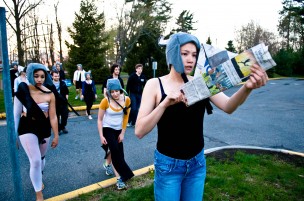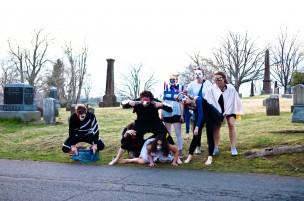Two students stood on cement steps railed with red and yellow balloons. A red crown was drawn on my hand. We stood there for a few minutes, awkwardly confused having just been initiated into a secret club that used crowns as currency. After a small group had gathered, a high pitched voice shouted, “Come to my birthday party!” And so it began: the meeting of the Wild Things.
This interactive and experimental adaptation of “Where the Wild Things Are” premiered this Friday at 182 Cross St. with two 45-minute shows. The show led the audience through an adventure on Indian Hill and allowed them to play with the “Wild Things” at sunset.
“Where the Wild Things Are” is a children’s book written by Maurice Sendak about a boy named Max who, after being put in time-out by his mother for gallivanting around in a
wolf costume, finds that his bedroom has transformed into a mysterious jungle. He sails to an island where he finds angry beasts known as the “Wild Things” and subsequently befriends them and becomes their king. Max then decides that he is tired and goes home, despite the distress of the Wild Things.
Directors Emmie Finckel ’14, Emma MacLean ’14, and Josef Mehling ’14 took the nostalgic themes from this childhood tale and transformed them into an interactive portrayal of the culmination of their college careers and the coming of adulthood.
“Part of the adaptation process has been sort of getting the analogy to our college experience and the three of us as seniors heading toward graduation and whatever lies beyond,” Mehling said.
Though there were officially three directors, the cast and crew both stressed the collaborative process.
“We [the directors] came up with a loose structure to break the play up into,” Finckel said. “But really we all worked together on developing the material with the whole group of people we cast.”
Not only was the production process dependent upon collaboration between cast and crew, but also with the audience itself. Maddy Oswald ’14, who played a character in the play, noted the show’s dependence on audience participation.
“I’ve never done a show where the audience actually makes the show,” Oswald said. “So much of our actions are for the audience based on how the audience is interacting with us and just trying to include them.”
In a sense, the audience became as much a character in the play as the actors. Audience member and visiting international student Martin Gschwentner shared this viewpoint after seeing one of Friday’s performances.
“I really like how they involved everybody,” Gschwentner said. “It really felt like everybody was playing a role.”
An exciting and crucial role for the directors was selecting the actors based on a quirky and creative Wes-inspired aesthetic.
“In the casting process, we were really looking for people who weren’t necessarily theater people but were creative thinkers and people who would come into this process and want to contribute their thoughts and ideas rather than sort of performing whatever we threw at them,” Finckel said.
In order to ascertain the actors’ creativity, the directors created an unconventional and innovative audition process.
“We had people perform a silent movement piece to a poem and then also read a children’s book to us,” Mehling said. “So that was really a way to find people who would commit agency and personal creative independence to the project. And make sure that we got some weirdos in there, too.”
The show was certainly not lacking in things bizarre. After the audience was invited into a yard decorated for a birthday party, we had the opportunity to interact with the various characters. And characters they were. College students were walking around acting like kindergarteners: tossing things, insulting each other, and throwing tantrums. I felt like I had been thrown into a really bad birthday flashback that was in dire need of parental supervision.
The narrative was confusing as children raced around and the audience awkwardly watched and feigned understanding, unsure of their actual purpose. And then we were beckoned onto a cardboard boat, each assigned a role (such as the sea, bubbles, or ducks), and then made our way up Indian Hill. Here we met the Wild Things: bizarre skeleton-savage hybrids who growled and raced around the grassy land. The narrative became more obscure as we gathered in a large circle to watch a sacrificial crowning. There was so much confusion as we left the Wild Things, and yet the emotional weight of what had just happened was very potent.
“To me, it meant that we have to go on this journey away from home but we aren’t quite sure what to expect out there,” Oswald said. “You know that home is back there, but you’re off facing these Wild Things and you don’t know how they’re going to be or how you’re going to conquer them. I think that it mirrors my life right now.”
A majority of the cast was made up of seniors; these members found that the notion of leaving home to face these Wild Things paralleled their leaving the University to enter the adult world. Still, it was as much about reexamining the past as it was about conquering a fear of the future.
“Our mantra through this whole thing is ‘We’re 20 now, but we were 10 once,’” Oswald said. “So we’re trying to have some of that nostalgia factor in there.”
From speaking with the directors and cast, I anticipated that this nostalgia would provoke naivety and laughter. Instead, by the end of the show, I felt just a little too old and a little too sad. We walked back from the cemetery, serenading and consoling ourselves with a somber tune in an attempt to drown out the screams of the Wild Things as they stood across the asphalt sea. Max stood in the boat sobbing, once a fictitious storybook character and childhood hero but now a human with skin, bones, and a broken heart. I was overcome with nostalgia and melancholy. I didn’t want to face my own Wild Things.
The past is remembered as being comfortable and fun, but chances are the future that awaits us is also alight with laughter, success, and possibilities.
“We wish we could go back to being little and protected and not having to deal with real world things,” Oswald said. “But at the same time, the future is really exciting. The Wild Things aren’t scary, really, because [in the play] Max becomes friends with them and has a really good time.”
So perhaps, being at the beginning of the summer and at the end of an exciting phase in my life, I have no choice but to face the future and those scary, and yet brilliantly beautiful, Wild Things. And with that I toast, with beer, coffee, or whatever beverage proves my supposed adulthood, to a summer of self-remembrance and self-exploration. And just maybe at some point over the next few months I’ll put down the laptop and coffee or the phone and booze in favor of a glass of warm milk and a slightly worn storybook. Hopefully you will, too.


Comments are closed